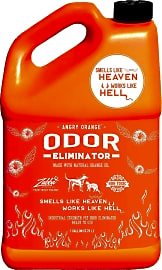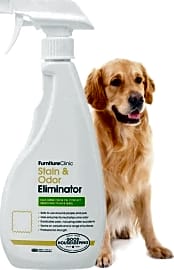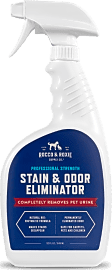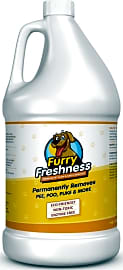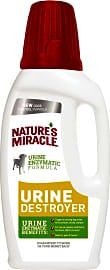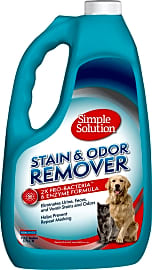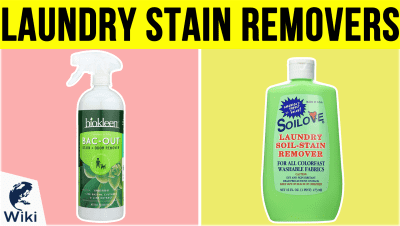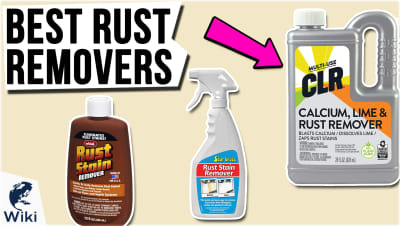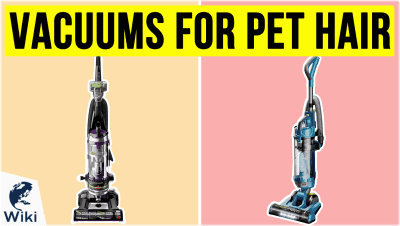The 10 Best Pet Stain Removers

This wiki has been updated 41 times since it was first published in February of 2016. Having a furry friend is mostly enjoyable, except for the occasional accident. But as long as you have one of these pet stain removers on hand, there's no reason to let unsightly marks and unpleasant urine odors ruin your carpets and upholstery. Our selection of cleaners includes solutions that are safe for both people and animals, many of which can be used on other marks, too. When users buy our independently chosen editorial selections, we may earn commissions to help fund the Wiki.
Editor's Notes
August 27, 2020:
With regard to updates, Bubbas Super Strength and Furniture Clinic Eliminator have been added to the list, while Zero Odor Molecular and Earth Rated Multi-Surface have been removed due to complaints about effectiveness. The top products have been shuffled a bit too, with Furniture Clinic Eliminator entering the list in third place, and Angry Orange Eliminator and TriNova Green Standard promoted to the second and first slots. If you're one of the unlucky pet owners who has to deal with stains on clothes, consider picking up a laundry stain remover too. They're crafted to be more gentle on fabrics than the household cleaners featured in this collection.
May 22, 2019:
This list contains items that, hopefully, will satisfy pet owners of every persuasion. All of the products here are safe and effective on accidents resulting from cats and dogs, and can also be useful for cleaning up biological messes created by — you guessed it — humans. By humans, of course, we're mostly referring to children. The primary criteria by which we judged cleaners were effectiveness and safety. These products don't just kill stains and odors, they're also safe for pets, humans, and even plants to be around, which is a lot to ask of a heavy-duty cleaner.
Kids 'N' Pets Instant was removed due to complaints about stains being left behind despite repeated treatments. Because of reports of a rancid odor occurring when it comes into contact with biological fluids, Petzyme Cleaner has also been removed from the list. In place of these two products, Earth Rated Multi-Surface and FurryFreshness Premium have been added to the third and second spots, the former due to its all-natural appeal, and the latter because of its unique, enzyme-free formulation.
Special Honors
Clorox Pet Solutions It's hard to think up a more iconic name in household cleaning products than Clorox, and it's easy to see why the brand is so respected. This versatile bleach-free formula is surprisingly gentle on surfaces and is, of course, safe for use around pets and every member of the family. petco.com
Bissell Pawsitively Clean This 32-ounce option features yet another enzyme-based formula that does a solid job of eliminating smells and unsightly marks, and it has a pleasant lavender fragrance, too. However, it is recommended that users test it on surfaces before cleaning to make sure it doesn't cause any damage. petsmart.com
Arm & Hammer Plus Oxi Clean If you're on the hunt for something that is specifically designed to tackle carpet messes, this may be the product for you. It features the famous stain-removing power of Oxi Clean, and a small amount of product goes a long way, which makes this one of the most budget-friendly options out there. target.com
Which Pet Stain Remover Is Best For Your Home?
Pet stain removers with natural enzymatic bacteria break apart the particles that cause odor, leaving a room smelling like the accident never happened.
The main active ingredients in a pet stain remover change dramatically depending on the brand, and whether the product is organic or made with more aggressive chemicals. People with small children in their home, or curious pets who will lick up any liquid on the ground, should stick to non-toxic stain removers, in case of accidental ingestion. Animal and environment lovers might want a formula that is environmentally friendly, so it doesn't send any harmful pollutants into the air.
In addition to protecting their kids and pets, people probably want to guard their furniture, too, which is why they should look for cleaners that state they are safe to use on wood and are chlorine-free. Some formulas treat the stain, but they don't eliminate the nasty odor left behind by vomit, urine, and feces. Pet stain removers with natural enzymatic bacteria break apart the particles that cause odor, leaving a room smelling like the accident never happened.
Removing odor isn't just about making a room smell tolerable for a person again; it also helps discourage animals from re-soiling the same area. There are several reasons dogs urine-mark a territory, and one of them is the fact that they smell another animal's pee there. So multi-pet households especially need to eliminate accident-related odors. Certain delicate fabrics cannot handle scrubbing, in which case one will need a pet stain remover that works on contact, with no extra scrubbing required. Some materials, like any microfiber fabric, shouldn't get wet. Households with microfiber furniture should look for a cleaning solution that doesn't require any rinsing.
How Bio-Enzymatic Cleaners Work
While some cleaners simply cover up odors, bio-enzymatic ones totally eliminate them. The particular combination of bacteria and microbial nutrients in these cleaners actually eats the organic waste produced by pets. Once these compounds digest the waste, they turn it into water and carbon dioxide (CO2), which are both odorless and colorless. After using a bio-enzymatic cleaner, all that should be left is CO2 and water, and since both of these naturally occur in the atmosphere, this type of cleaner is very environmentally friendly.
For this reason, some of them can work for up to 80 hours after being applied to a stain.
The wonderful thing about the bacteria in these cleaners is that they grow and multiply until they've completely consumed whatever natural waste they're near. For this reason, some of them can work for up to 80 hours after being applied to a stain. They essentially do not stop working until their work is done, unlike chemical-based cleaners, that often need to be applied over and over again. Sometimes a few of these cleaning bacteria survive even after the mess is eliminated, so they hang around, ready to tackle any new spots.
There are six different types of enzymes, three of which are used in these types of cleaner. Amylases break apart starch molecules, proteases destroy and digest protein-based molecules such as blood, and lipases work on fat molecules like oil. Between these three enzymes, there is almost no stain that a bio-enzymatic cleaner cannot remove, nor odor it cannot eliminate.
How To Stop Urine-Marking In The House
Since having one's carpet professionally cleaned can cost as much as $350, training a dog not to urine-mark in the home isn't only good dog parenting, it's also financially responsible. First off, unspayed and unneutered dogs urine-mark more than those who have been fixed. Trying any of these other training tactics will be especially hard on an unfixed dog.
Some mark compulsively when they're nervous, the way humans might bite their nails.
Dogs tend to mark areas where they feel they haven't made their presence known. So, if a person catches their dog marking a certain room, they should actually spend more time with their dog in there, playing with them, feeding them and cuddling with them in there. This will make the dog feel that they don't need to mark the area. Many dog owners have had the experience of bringing a new item home, only to have their dog immediately pee on it. Dogs often mark things that are new and foreign to the home. Anything that a dog might view as foreign, like a guest's sweater, or a new painting, should be put somewhere that the dog cannot reach it.
Pet owners should take special precautions when introducing a new dog to the pack. Not doing so can result in fighting, and it can also result in excessive urine-marking. There is always the possibility that a dog is marking out of anxiety. Some mark compulsively when they're nervous, the way humans might bite their nails. If that is the case, the owner has to get to the root of the animal's anxiety.


